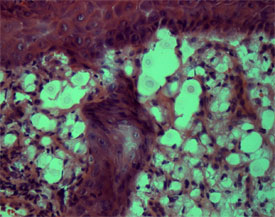
The University of Pennsylvania Health System provides a tremendous platform for clinical training with a wide variety of experiences and patient populations through our four hospitals, home care services, long term care facilities, and 300 physician practices. The University of Pennsylvania is a world-class research institution that has consistently ranked as one of the top five institutions in the country receiving NIH funding. The medical school and hospital are located adjacent to the undergraduate campus, the School of Veterinary Medicine, School of Dental Medicine, and School of Nursing facilitating interactions and collaborations among investigators in all basic science and clinical research departments on campus.
Hear from the Infectious Disease Faculty
Learn about the Division of Infectious Disease fellowship program directly from our faculty.
Watch our videos
First Year of ID Fellowship
The first year of fellowship is devoted primarily to clinical training. This training focuses on various aspects of Infectious Diseases practice in both the inpatient and outpatient setting and takes place across the larger Penn campus at our training hospitals including:
- Hospital of the University of Pennsylvania
- Penn Presbyterian Medical Center
- Pennsylvania Hospital
- Philadelphia Veterans Affairs Medical Center
- Chester County Hospital
- HUP - Cedar
We endeavor to make the most of every training opportunity and to that end offer electives throughout our system and beyond including:
- Pediatrics at the Children's Hospital of Philadelphia
- Outpatient HIV clinics at the Jonathan Lax Center
- Public health offerings at the Philadelphia Department of Health
Our busy ambulatory care clinics see patients with a wide variety of infectious diseases and our association with the Infectious Diseases Division's AIDS Clinical Trials Unit and the University's Center for AIDS Research insures a strong outpatient experience with an emphasis on HIV treatment.
Other outpatient practices in the ID Division focus on hepatitis C, HIV/hepatitis co-infection, mycobacterial diseases, skin/soft tissue infections, travel medicine, immunosuppressed hosts (including solid organ and stem cell transplant recipients), and post-hospital care of infections including endocarditis and osteomyelitis.
The educational opportunities during the fellowship program are also rich and deep. You will round with and teach Penn medical students and residents, who are among the finest in the country. The Infectious Diseases faculty is committed to providing high-quality teaching. Our reputation for training is evidenced by our success in attracting our own house staff into our fellowship training program.
Upper Year(s) of ID Fellowship
After completion of the first year of fellowship, ID fellows typically choose one of three paths:
- Clinical academic
- Clinical research
- Bench science
Clinical Academic Training
Fellows choosing to pursue a clinical academic path will select from among several focused “tracks” to gain experience in specific areas of Infectious Diseases. These tracks are:
- Healthcare Epidemiology/Antimicrobial Stewardship
- Transplant Infectious Diseases
- Critical Care Infectious Diseases
- HIV and Viral Hepatitis.
- Opioid Use Disorders and Infectious Diseases
*Fellows pursuing advanced clinical training in one of the tracks will typically complete ID fellowship after two years
Global Health
Advanced training in Global Infectious Diseases is also available through the Botswana-UPenn Partnership. Fellows will typically spend a minimum of three months during the second year at our site in Gaborone, Bostwana and may have options to spend all or part of the third year in Botswana depending on their research and clinical focus. The clinical time will be divided between the inpatient services and outpatient clinics at the Princess Marina Hospital and the fellow will also spend time working with program physicians in the outreach program, visiting sites throughout the country.
Clinical Research Training
Fellows choosing to pursue a clinical research path will typically apply for advanced training in one of the clinical research training programs at Penn. Most often, fellows will pursue training in the Master of Science in Clinical Epidemiology (MSCE) training program or the Master of Science in Health Policy Research (MSHP) training program. Training in the Master of Science in Translational Research (MSTR) or Master of Public Health (MPH) are also possible. Typically, two years of funding are available through an institutional training grant with further funding available through subsequent NIH funding. Fellows pursuing advanced clinical research training will typically complete ID fellowship after three years.
Basic Science Training
Fellows choosing to pursue a basic science research path identify a faculty mentor during their first year of fellowship and join the laboratory at the beginning of their second year of ID fellowship. The University of Pennsylvania has a very collaborative and integrated research program in immunology, microbiology, virology, and parasitology. ID fellows interested in basic science research can identify a laboratory from an extensive list of research topics and mentors. Typically, two years of funding are available through several institutional training grants from NIH and AHRQ with further funding available through subsequent federal funding. Fellows pursuing advanced basic science research training will typically complete ID fellowship after three years.
Contacts
Emily Blumberg, MD
Professor of Medicine
Fellowship Program Director
Email: eblumber@pennmedicine.upenn.edu
Sarah Longworth, MD
Fellowship Associate Director
Email: sarah.longworth@pennmedicine.upenn.edu
Sandra Vera Erby
Fellowship Program Coordinator
Email: Sandra.Erby@pennmedicine.upenn.edu
Phone: 215-615-4724